Jump to Section
1. Introduction
Does salt make water boil faster? One of the most persistent kitchen myths is that adding salt to water makes it boil faster. If you’ve ever tossed a pinch of salt into a pot, hoping it will speed up the boiling process, you’re not alone. This seemingly simple trick has been passed down for generations, but is there any truth to it? Many people believe that by increasing the boiling point of water, salt can somehow make it reach that critical temperature quicker. However, the reality is far more complex than this common misconception.
Understanding the science behind this myth is crucial not just for home cooks, but for anyone interested in cooking techniques. Whether you’re preparing pasta or boiling vegetables, knowing how salt impacts the boiling process can help you make better decisions in the kitchen. In this blog, we will explore the true relationship between salt in water and boiling water, explaining how salt affects the boiling point and why it doesn’t necessarily lead to faster boiling. By the end, you’ll have a clearer understanding of the science behind the myth of boiling faster and how to properly use salt in your cooking for the best results.
Let’s dive into the facts and dispel the myth of boiling water once and for all.
2. Understanding the Boiling Point of Water
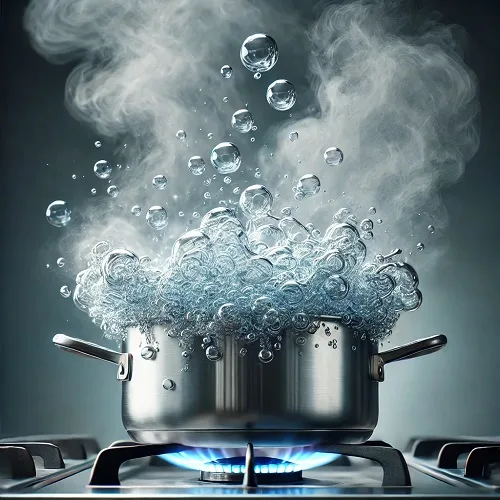
It’s important to understand the boiling point of water. In simple terms, boiling occurs when water reaches a temperature where it changes from a liquid to a gas. For pure water at sea level, this happens at 100°C (212°F). This is the temperature at which the water molecules have enough energy to break free from the liquid state and turn into steam.
However, the boiling point of water isn’t always the same. Several factors can affect the temperature of water at which it boils. One significant factor is pressure. At higher altitudes, for example, the air pressure is lower, and water boils at a temperature lower than 100°C. This is why it takes longer to cook food in places like the mountains compared to sea level.
Another factor that impacts the boiling process is the presence of other substances, such as salt. When salt is dissolved in water, it alters the properties of the water. Specifically, it increases the boiling point, a phenomenon known as boiling point elevation. This occurs because the salt molecules interfere with the water molecules’ ability to evaporate, requiring the water to reach a higher temperature before boiling.
It’s essential to note, though, that while salt does indeed increase the boiling point, this doesn’t necessarily mean the water will boil faster. The change in the boiling point is often so small that it won’t noticeably affect how quickly the water reaches its boiling stage. In fact, the effect of salt is minimal compared to other factors like the heat source or the volume of water being heated.
Understanding these factors can help clarify why adding salt to water doesn’t result in faster boiling.
3. The Science of Salt and Water: Does It Affect Boiling Time?
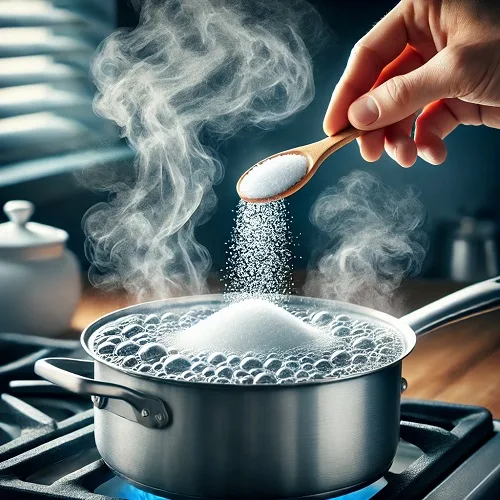
When you add salt to water, you are altering the water chemistry in a way that affects its physical properties. This process is not about making the water boil faster but about increasing the boiling point of the water. This phenomenon is explained through a concept known as colligative properties—a principle in chemistry that describes how the addition of a non-volatile solute (like salt) can change the physical characteristics of a solvent (like water).
Dissolved salt creates a solution where the salt concentration disrupts the normal behavior of the water molecules. Essentially, the salt ions interfere with the water molecules’ ability to escape into the air as steam, which is what happens during the boiling process. As a result, it requires more heat to break these molecular bonds and convert the liquid into gas. This leads to an increase in the boiling point of water. So, in theory, the more salt you add, the higher the boiling point will be.
However, this increase in the boiling point does not necessarily mean the water will boil faster. In fact, while the water will reach a higher temperature before it boils, it does not get there any quicker. The process of boiling still takes the same amount of time because the heat source is still overcoming the same amount of water’s heat capacity and temperature change.
The reason why it may seem like the water boils faster when salt is added is due to a psychological effect. People often associate the boiling process with the moment the water starts to bubble. Adding salt can cause these bubbles to form more quickly or visibly, creating the illusion that the water has boiled faster. But in reality, the water is still taking the same amount of time to heat up to the higher boiling point.
So, while salt does have an effect on the boiling point of water, it’s important to remember that does salt make water boil faster is a myth. It only changes the temperature at which the water boils, not the time it takes to reach that point. Understanding this distinction clears up the confusion around this popular kitchen belief.
4. Factors That Affect Boiling Time
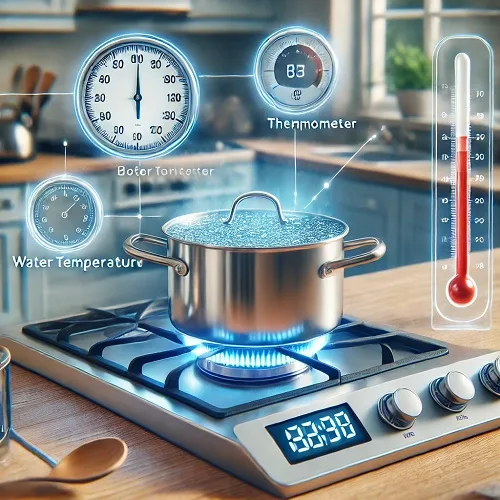
While the presence of salt in water can influence the boiling point, it doesn’t have a significant impact on boiling time. There are several other crucial factors that determine how quickly water boils, and they are often far more influential than the addition of salt.
One major factor is heat transfer. The efficiency of the heat source plays a vital role in how quickly water reaches its boiling point. For example, a gas stove typically heats water faster than an electric stove due to the direct flame contact with the pot. Similarly, an induction stove provides rapid heat transfer by directly heating the pot through electromagnetic fields. Therefore, the type of stove you’re using has a direct influence on boiling time.
Water volume also significantly impacts boiling time. The more water you’re heating, the longer it will take to reach its boiling point. A small pot with a minimal amount of water will boil much faster than a large pot filled to the brim. This is because the heat energy has to be distributed across a larger volume, extending the time required to bring the water to a boil.
The pot material is another crucial factor. Pots made from materials like copper or aluminum are great at conducting heat, meaning they heat up quickly, reducing boiling time. In contrast, materials like cast iron or thick stainless steel are slower to heat and, therefore, take longer to boil water.
In this context, the addition of salt may seem to have an effect on boiling time, but it’s actually these external factors that play the most significant role. The presence of salt may give the appearance of faster boiling because it can cause more visible bubbles to form. However, in terms of actual boiling time, the impact of salt is negligible compared to factors like heat transfer, water volume, and pot material.
Understanding these variables helps clarify why salt in water doesn’t make it boil faster as some believe.
5. Common Myths About Boiling Water and Salt
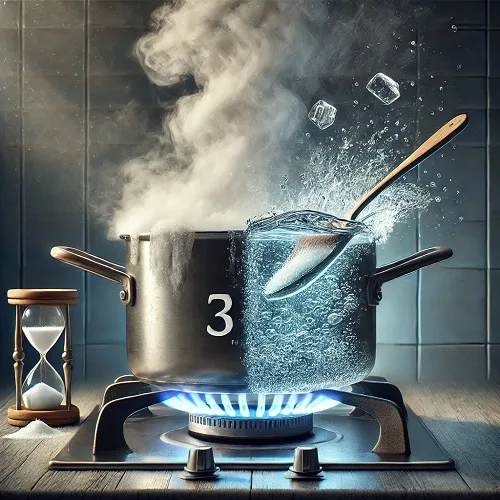
There are several myths that have been passed down through generations regarding salt and boiling water. One of the most persistent misconceptions is that salt makes water boil faster. Many people believe that by adding a pinch of salt to the pot, they can reduce cooking times for pasta or other boiled foods. This myth persists despite the scientific evidence to the contrary.
The truth is, salt doesn’t speed up the boiling process at all. In fact, as we’ve learned, adding salt to water actually raises the boiling point, meaning the water must reach a higher temperature before it starts boiling. This might suggest that it takes slightly longer for water to boil with salt, not less. The key takeaway is that while the boiling point is increased, the time to reach that point is not significantly reduced.
Some might argue that they’ve noticed water boiling faster with salt because of the increased rate at which bubbles form, or perhaps because their pot has been on a higher heat setting. These observations, while valid, have little to do with the actual physics of boiling water and are more about kitchen science or personal perception. In reality, factors like heat transfer, water volume, and pot material have a far greater influence on how quickly water boils than the addition of salt.
These cooking tricks and kitchen beliefs are fascinating, but the myth that salt makes water boil faster doesn’t hold up under scrutiny. Understanding the science behind this can help debunk these widespread misconceptions.
ALSO READ
Ultimate 7-Day Meal Plan for Ulcerative Colitis: Revitalize Your Gut & Soothe Symptoms Naturally
Alexia Onion Rings in an Air Fryer: Delicious Crispy Rings in Minutes
Onion Rice Recipe: The Ultimate Guide to a Flavorful Side Dish
What is Hokkaido Milk Tea? A Creamy Delight
How to Make Butter from Raw Milk: Discover the Joy
6. When Does Salt Actually Benefit Boiling Water?
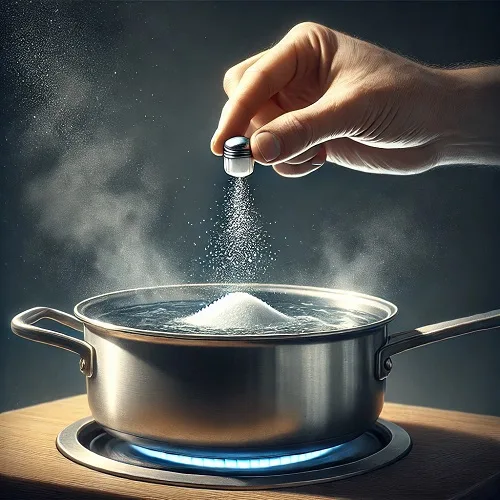
While salt doesn’t speed up the boiling process, it does play an important role in cooking, particularly when it comes to flavor enhancement. One of the most common instances where salt is added to water is when cooking pasta. Adding salt to the boiling water doesn’t make it boil faster, but it serves a crucial purpose. The salt dissolves into the water, increasing its salinity, which in turn helps to season the pasta evenly as it cooks. This ensures that the pasta is not bland and enhances its flavor during the cooking process.
In addition to flavor, salt’s role in cooking extends to helping regulate the texture of certain foods. For example, when boiling vegetables, adding salt to the water can help retain their natural color and preserve their structure. The salt interacts with the water and helps prevent the vegetables from becoming too soft or mushy.
It’s important to note, though, that salt’s role in cooking is primarily about seasoning and not about affecting the boiling speed. While it does increase the boiling point of water, the effect is so small that it won’t make a noticeable difference in how quickly your water reaches the boiling point. Instead, the real benefit of salt is in enhancing the flavor and texture of the food being prepared.
In conclusion, salt’s benefits in boiling water are centered around flavor enhancement and improving the cooking process, not making the water boil faster.
7. Practical Tips for Boiling Water Efficiently
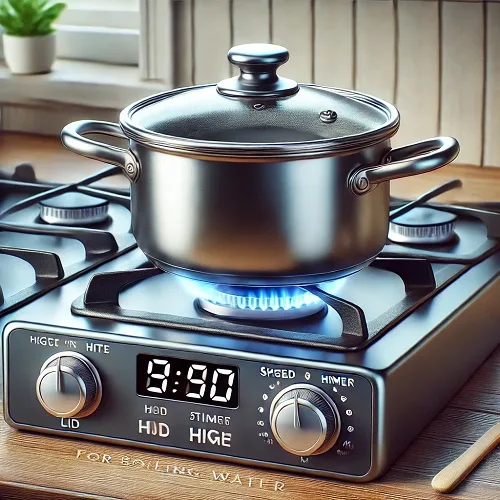
If you’re looking to boil water quickly, there are several strategies that will help you achieve faster results—none of which involve adding salt to water. First, ensure you’re using the right heat source. Gas stoves typically provide faster heat transfer compared to electric stoves, so if you’re in a hurry, a gas burner might be your best bet.
Another useful tip is to always keep a lid on the pot. Covering the pot traps heat inside, which raises the water temperature faster and reduces boiling time. In addition, consider using a smaller pot with the right water volume—the less water, the quicker it will reach a boil.
Finally, set your stove to the highest temperature setting to maximize heat output. With these simple steps, you’ll be able to boil water quickly without relying on any myths about salt and boiling faster.
8. Conclusion
Does salt make water boil faster? To wrap up, it’s clear that salt does not make water boil faster. While it does affect the boiling point, increasing it slightly, it does not reduce the boiling time. The myth that salt speeds up water boiling has persisted for years, but understanding the science behind it is crucial for cooking efficiently.
To boil water more quickly, focus on using the right heat source, keeping a lid on the pot, and managing water volume. These methods will ensure that you achieve your desired result without relying on salt or any other cooking misconceptions.
Ultimately, understanding the science of cooking can help you make better, more informed decisions in the kitchen. While adding salt may be essential for flavor, it’s important to know that it’s not a shortcut for speeding up the boiling process.
9. Frequently Asked Questions (FAQ)
1. Does adding salt to water make it boil faster?
No, adding salt in water does not make it boil faster. It raises the boiling point, which means the water needs to reach a slightly higher temperature before it boils.
2. Why does my water seem to boil faster with salt?
It might appear to boil faster because salt can cause bubbles to form more quickly, but this is just a visual effect. The actual boiling time remains the same.
3. Does the amount of salt I add to water affect how quickly it boils?
No, the amount of salt in water has very little effect on the boiling time. While it can increase the boiling point, the change is so small that it doesn’t significantly impact boiling time.
4. Can salt in water improve the taste of boiled food?
Yes, cooking with salt enhances the flavor of foods like pasta or vegetables by seasoning them as they cook.
5. Does salt help retain the color of vegetables while boiling?
Yes, salt can help vegetables retain their color and texture during boiling by preventing them from becoming too soft.
6. What happens if I add too much salt to boiling water?
Too much salt in water can lead to overly salty food and may also make the water boil more slowly because of the added solute concentration.
7. Can I use salt in water for faster cooking times with pasta?
While salt doesn’t speed up the boiling time, it does improve the flavor of pasta and helps season it properly as it cooks.
8. Does the type of salt matter when boiling water?
No, whether you use table salt, kosher salt, or sea salt, the effect on boiling point is negligible. The flavor enhancement will be similar.
9. Why do some people say salt helps water boil faster?
This is a common cooking myth. People often believe that adding salt speeds up boiling time, but in reality, it only affects the boiling point.
10. Can salt lower the time it takes to bring water to a rolling boil?
No, salt doesn’t reduce the time to reach a rolling boil. The water still needs to reach a higher temperature before it boils due to the increased boiling point.
11. How can I make my water boil faster without salt?
To boil water quickly, use a lid on the pot, ensure the stove is set to high heat, and use a pot with a good heat conductor like copper or aluminum.
12. Should I add salt to water for all cooking purposes?
You should add salt to water primarily for flavor enhancement, especially for foods like pasta, potatoes, or vegetables. It’s not necessary for all cooking.
13. Does adding salt affect the water’s texture or consistency?
No, salt in water does not change the texture of the water. However, it may slightly affect the texture of certain foods, such as making pasta firmer.
14. Is it necessary to add salt when boiling potatoes?
It’s not necessary, but salt in water can help season the potatoes, enhancing their flavor as they cook, especially if you’re making mashed potatoes.
10. References
- Serious Eats – An authoritative culinary resource that debunks the myth of adding salt to water to speed up boiling time, explaining that the effect is minimal and does not significantly impact cooking efficiency.
Serious Eats – How to Boil Water Faster - ScienceDirect – A leading resource for scientific studies, including research on water chemistry and the effects of solutes on physical properties like boiling points.
ScienceDirect – Boiling Point Elevation - ThoughtCo – An educational resource detailing how adding salt to water raises its boiling point, requiring a higher temperature to achieve boiling. ThoughtCo. – Why Adding Salt to Water Increases the Boiling Point






